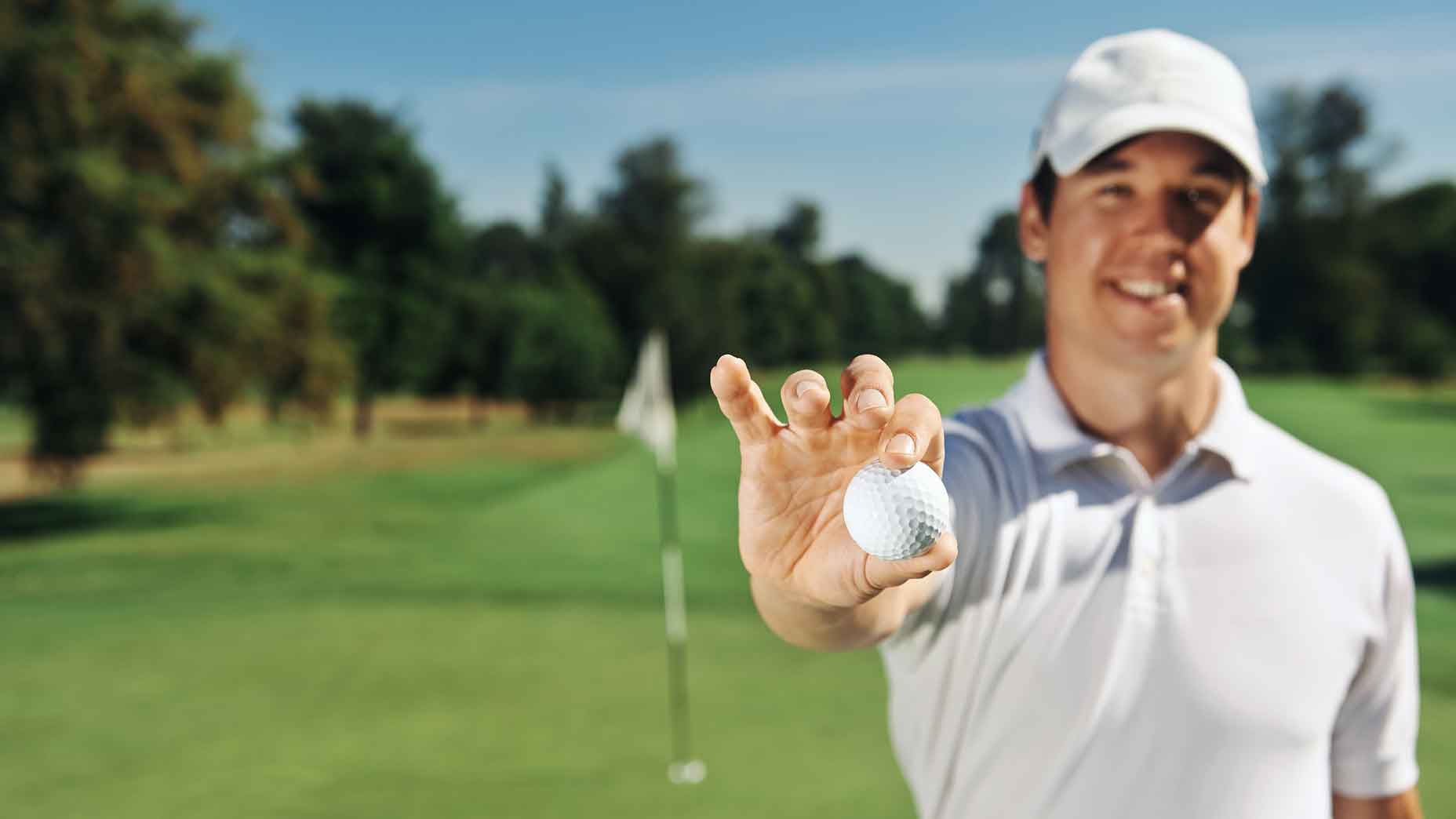
What do the rules say about using different color balls during a round?
Getty Images
The Rules of Golf are tricky! Thankfully, we’ve got the guru. Our Rules Guy knows the book front to back. Got a question? He’s got all the answers.
Can I use different color balls during a round if they’re all the same make and model? I use orange on the first tee, green on the second tee, yellow on the third, then follow this pattern for the rest of the round. My golf buddies are more traditional players who use only white, and my rotation drives them crazy — but am I cheating?
—Tim LaRocque, via email
What you are, Tim, is a colorful character! (And, coincidentally, “Tim LaRocque” is Rules Guy’s stage name when he fronts his Spinal Tap cover band.)
With no special Local Rules in effect and provided that you play a conforming golf ball, Rule 4.2a doesn’t restrict the kind of ball you may change to, whether between holes or when otherwise permitted to substitute.
That said, if Model Local Rule G-4 (aka “the one-ball rule”) is in effect, you would not, repeat not, be allowed to change to a different colored ball of the same make and model. Why? White, orange, green, yellow and so on are different line items on the Conforming Ball List; ergo, they’re treated as different balls under that Local Rule.
There is a potential, albeit half-crazy workaround: You could take a highlighter pen and hand-draw one make/model ball into different colors and be in the clear under the rules. Do that, Mondrian, and color us impressed.
For more ball-related guidance from our guru, read on …
Someone in my weekly league has an incessant habit of lifting any ball she thinks might be hers without marking it. She refuses to take out her reading glasses and literally brings the ball up to her nose to identify it. To be clear, I’m not talking about searching for her ball. All of these balls are in plain sight in either the fairway or the rough. Whether or not it is her ball, she usually replaces the ball by tossing it from a height of a few inches near the original spot. If the ball is hers, I know she should be assessed a one-stroke penalty for not marking her ball and possibly a general penalty for playing an incorrectly substituted ball or playing from the wrong place. However, what is the ruling if she picks up my ball and does not mark it or replace it properly? I’m really not sure she incurs any penalty for this behavior and I find that absolutely mind-boggling. Rule 7.4 states there is no penalty if the player’s ball is accidentally moved by the player, opponent or anyone else while trying to identify it and it should just be replaced on its original spot. The penalty for breach of Rule 7.4 is the general penalty. Would you classify this player’s behavior as accidental?
—Kathy Bailey, Glen Cove, N.Y.
First off, my sympathies: Playing with Mrs. Magoo, picking up balls willy-nilly, must be exasperating. From a Rules perspective, players in the same group in stroke play are outside influences to each other, and, hard as it is to swallow given the specifics of your case, there’s no penalty if an outside influence moves a player’s ball.
Indeed, it’s the responsibility of the ball’s owner, when she has knowledge or virtual certainty of her ball being moved, to replace it on the original spot before she plays on, lest she incur a penalty stroke.
In match play, the player would get one penalty stroke for lifting your ball in play since she didn’t follow the required procedure for lifting a ball for identification. You would still need to ensure your ball gets replaced on the original spot, though either you or your opponent could do so.
Given that your nemesis’s behavior is a (bad, bad) habit, this is a matter that should be addressed before play, either by you or by the club, which could warn her that continuing this heedless lifting will result in some sort of ban. Failing that, Rules Guy suggests you get to your ball faster than she does.
Need help unriddling the greens at your home course? Pick up a custom Green Book from 8AM Golf affiliate Golf Logix.
Got a question about the Rules? Ask the Rules Guy! Send your queries, confusions and comments to rulesguy@golf.com. We promise he won’t throw the book at you.










